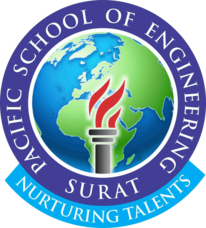
Pacific School of Engineering
Approved by AICTE,New Delhi and Affiliated to GTU,Ahmedabad
Integrated M.Sc. IT | Degree Engineering | Diploma Studies
Laboratories
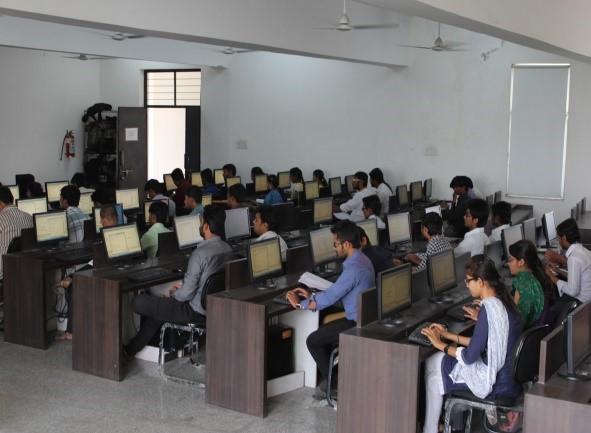
AI, IOT, Cloud Computing and Python Lab

Lab Description
AI (Artificial Intelligence) Lab: In an AI lab, students explore various techniques and algorithms used to create intelligent systems that can simulate human-like behavior. They learn about topics such as machine learning, neural networks, natural language processing, computer vision, and robotics.
IoT (Internet of Things) Lab: In an IoT lab, students learn about the design, implementation, and deployment of IoT systems that connect physical devices to the internet to collect and exchange data. They study concepts such as sensor networks, wireless communication protocols, embedded systems, and cloud integration.
Cloud Computing Lab: In a Cloud Computing lab, students explore the principles and technologies behind cloud computing, which involves delivering computing services over the internet. They learn about cloud infrastructure, virtualization, distributed systems, networking, and security in the cloud.
Python Lab: In a Python lab, students focus on learning the Python programming language, which is widely used for various purposes such as web development, data analysis, machine learning, and scripting. They learn about Python syntax, data types, control structures, functions, modules, and object-oriented programming.
|
Lab Name |
AI, IOT, Cloud Computing and Python Lab |
|
Configuration |
Intel® Core™ i5 RAM: 8.00GB SSD: 1TB OS:Windows 11 |
|
No. of Machines |
20 |

Java and Web Programming Lab

Lab Description
Java Programming Lab: In a Java Programming Lab, students learn and practice programming concepts using the Java programming language. They cover fundamental Java syntax, object-oriented programming principles, data types, control structures, and classes.
Web Programming Lab: In a Web Programming Lab, students learn about technologies and frameworks used for web development. They study HTML (HyperText Markup Language), CSS (Cascading Style Sheets), and JavaScript for building the structure, styling, and interactivity of web pages.
|
Lab Name |
Java and Web Programming Lab |
|
Configuration |
Intel® Core™ i5 RAM: 8.00GB HDD: 1TB OS:Windows 10
|
|
No. of Machines |
20 |
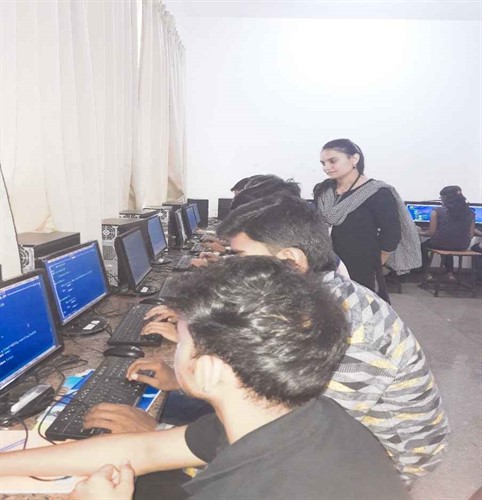
DBMS, DS and ADA Lab

Lab Description
DBMS (Database Management Systems) Lab: In a DBMS lab, students typically work with software tools and systems used to manage databases. They learn about concepts such as creating and managing databases, designing schemas, querying data using SQL (Structured Query Language), and implementing database transactions.
DS (Data Structures) Lab:In a DS lab, students learn about fundamental data structures and algorithms used to organize and manipulate data efficiently. They study concepts such as arrays, linked lists, stacks, queues, trees, graphs, and hash tables.
ADA (Analysis and Design of Algorithms) Lab: In an ADA lab, students focus on the analysis and design of algorithms to solve computational problems efficiently. They study various algorithm design techniques such as divide and conquer, dynamic programming, greedy algorithms, and backtracking. Students implement algorithms in programming languages and analyze their time and space complexity.
|
Lab Name |
DBMS, DS and ADA Lab |
|
Configuration |
Acer/Veriton Series Intel(R) Core(TM) i3-4160 CPU@3.60 GHz RAM:4.00GB HDD:500GB OS: Windows 10 |
|
No. of PC |
20 |
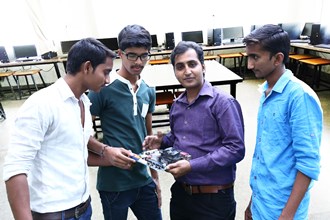
PPS,OS and CN Lab

Lab Description
PPS: A "Programming for Problem Solving" lab is designed to help students develop problem-solving skills using C programming.The lab begins with an introduction to various problem-solving techniques such as understanding the problem, breaking it down into smaller subproblems, devising algorithms, and designing efficient solutions.
OS: OS, or Operating Systems, are software programs that manage computer hardware and provide services for computer programs. The operating system acts as an intermediary between the hardware and the user applications, handling tasks such as process management, memory management, file system management, and device management.
CN: CN, or Computer Networks, is the study of how computers and other devices are interconnected to facilitate communication and resource sharing. Computer networks enable data transmission between devices, allowing users to access remote resources, share files, and communicate over long distances.
|
Lab Name |
PPS,OS and CN Lab |
|
Configuration |
Acer/Veriton Series Intel(R) Core(TM) i3-2120 CPU@3.30 GHz RAM: 4.00 GB HDD:500 GB OS: Windows 10/Ubuntu |
|
No. of PC |
20 |

Project Lab

Lab Description
Project Lab: A Project Lab is a practical learning environment where students work on hands-on projects to apply the knowledge and skills gained in their coursework. a Project Lab provides students with valuable hands-on experience, fosters teamwork and collaboration, and prepares them for real-world challenges in their respective fields of study or industry domains.
|
Lab Name |
Project Lab |
|
Configuration |
Intel® Core™ i5 RAM: 8.00GB HDD: 1TB OS:Windows 10 |
|
No. of Machines |
20 |

Mechanical Operations

Lab Description
Practical related to size reductions, handling of solids and its transportations are carried out in this laboratory.
|
Lab Name |
Mechanical Operations |
|
Lab Equipments |
Ball mill, Jaw crusher Plate & Frame filter press, Sedimentation Cyclone separator Sieve shaker Roll crusher Hammer mil Froth flotation cell. |

Mass Transfer Operations

Lab Description
This lab consists of equipment used to carry out separation process using concentration as driving force. The Pilot scale facility provide students with good background about industrial equipments
|
Lab Name |
Mechanical Operations |
|
Lab Equipments |
Ball mill, Jaw crusher Plate & Frame filter press, Sedimentation Cyclone separator Sieve shaker Roll crusher Hammer mil Froth flotation cell. |

Process Heat Transfer

Lab Description
The lab consists of equipment used for conducting heat transfer process. Different mode of heat transfer can be studied and practical like evaporator and heat exchangers gives understanding and application of heat transfer in industry.
|
Lab Name |
Process Heat Transfer |
|
Lab Equipments |
Unsteady state heat transfer unit Stefan Boltzmann apparatus Double pipe heat exchanger(Parallel & Counter Flow) Heat Transfer through Lagged pipe Heat transfer in Natural Convection Emissivity measuring apparatus Heat Transfer through Composite wall Thermal Conductivity of Insulation powder, Heat transfer in forced convection |

Instrumentation & Process Control

Lab Description
Practical related to control philosophy used in industry are studied. The trainer setup gives idea about process control mechanism in Chemical Industry
|
Lab Name |
Instrumentation & Process Control |
|
Lab Equipments |
Interacting &Non -Interacting System Pressure Control Trainer Level Control Trainer |
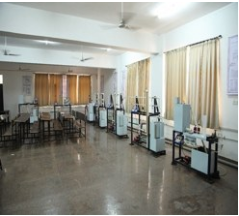
Fluid Flow Operations

Lab Description
This lab has basic fluid mechanics set-up. The lab is equipped with different flow measuring set-ups such as Venturimeter, orifice-plate, pitot tube, rotometer etc., where students can visualize the basic theory of working of the flow meter.
|
Lab Name |
Fluid Flow Operations |
|
Lab Equipments |
Bernoulli's Theorem Study Of Pressure Measurement Cavitations Apparatus Venturimeter, Orifice meter And Rota meter Calibration Setup Losses Due To Pipe Fittings Sudden Enlargement And Sudden Contraction Losses Due To Friction In Pipelines Reynold's Apparatus Metacentric Height Apparatus Pitot Tube Setup Nozzle Meter Test Rig Laminar Flow Table Free Vortex Apparatus Forced Vortex Apparatus |
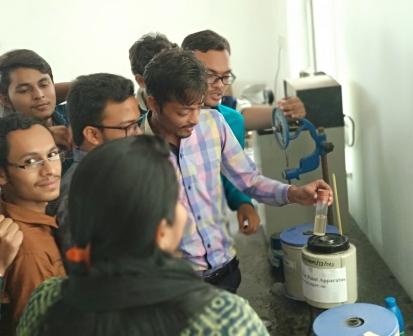
Petroleum Refining & Petrochemicals

Lab Description
The lab consists of instruments related to testing and analysis of various property of crude oil and different fuels used in Chemical Industry and for commercial purpose.
|
Lab Name |
Petroleum Refining & Petrochemicals |
|
Lab Equipments |
Saybolt Viscometer Redwood Viscometer Ring and Ball Apparatus Able's Flash Point Apparatus Pensky Martin's Apparatus Cloud and Pour Point Apparatus Penetration Index Condrason Apparatus Reid Vapor Pressure Digital Bomb Calorimeter |
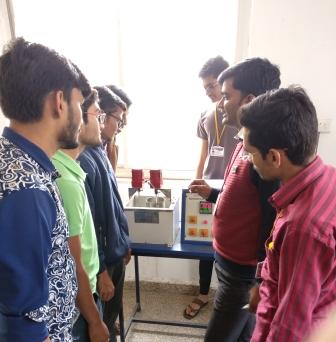
Chemical Reaction Engineering

Lab Description
This lab is one of the most important labs in the chemical engineering study. In this lab, student will perform experiments to support their theoretical study of Chemical Reaction Engineering. It includes the experimental studies using different type of reactors for determining kinetic and RTD data.
|
Lab Name |
Chemical Reaction Engineering |
|
Lab Equipments |
Plug Flow Reactor Coiled Tube Type Reactor Packed Bed Reactor Isothermal Batch Reactor Adiabatic Batch Reactor Continuous Stirred Tank Reactor in series |
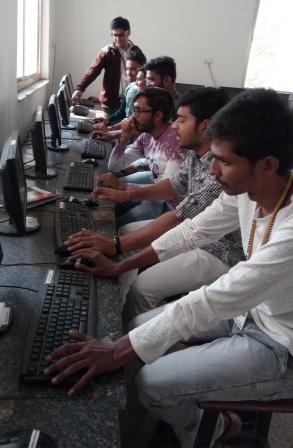
Computer Lab (PMSO and CAPS)

Lab Description
Various simulation tools like scilab, DWSIM, Pipe flow expert, MS- Excel are used for optimization and modeling are studied in this laboratory.
|
Lab Name |
Computer Lab (PMSO and CAPS) |
|
Lab Equipments |
21 Nos of Computer DWSIM and SCILAB software |

Chemistry / Applied Chemistry / Unit Process Lab

Lab Description
The lab consists of various chemicals and analytical instruments used in Chemical Industry.
|
Lab Name |
Chemistry / Applied Chemistry / Unit Process Lab |
|
Lab Equipments |
Burette stand plastic , Bottle Brush, Burette clamp Distillation Apparatus Electronic Digital Balance Flame Photometer Digital UV-Spectrophotometer |

Concrete Laboratory

Lab Description
A concrete technology lab plays a vital role in researching, developing, and optimizing concrete mixes to enhance strength, durability, and sustainability. It facilitates quality control and innovation, ensuring the construction of safe, resilient, and cost-effective infrastructure projects. Additionally, it serves as a hub for training future engineers and technicians in modern concrete practices and advancements.
|
Lab Name |
Concrete Laboratory |
|
Equipment |
Mould-Big, Mould-Small, Mould-Circular Flakiness Apparatus, Proctor Test Apparatus Slump Test Apparatus, Impact Test Apparatus Tar Viscometer Apparatus, Standard Penetrometrer Vicat Apparatus, Le-Chatilier, Elongation Apparatus C.B.R Test Apparatus, Compression Testing Machine. |
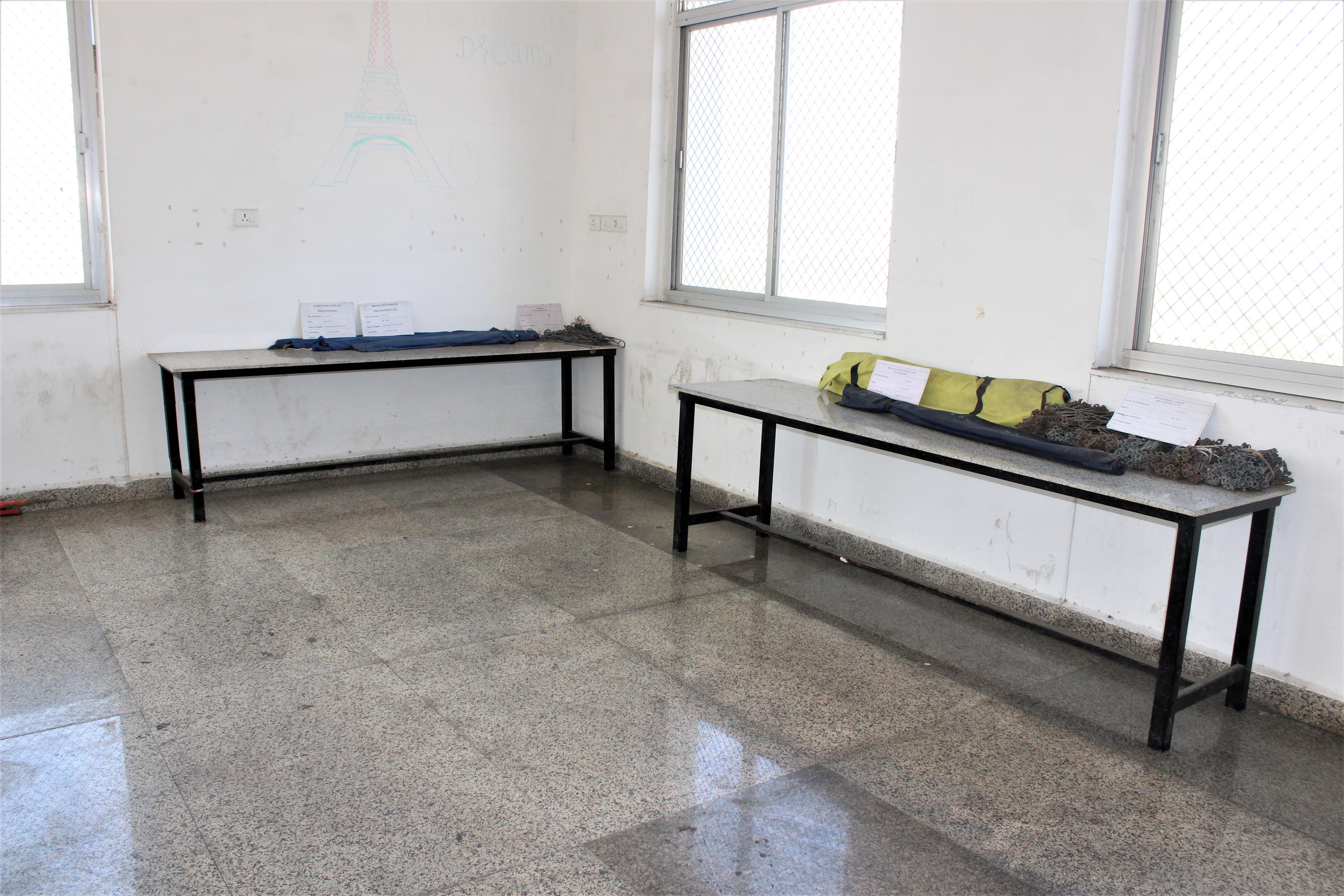
Elements of Civil Engineering

Lab Description
The Basic Civil Engineering lab is crucial for introducing students to fundamental principles and techniques in civil engineering through hands-on experiments and demonstrations. It provides a foundational understanding of key concepts like surveying, construction materials, and structural analysis, laying the groundwork for more advanced coursework and practical applications.
|
Lab Name |
Elements of Civil Engineering |
|
Equipment |
Engineer Plane Table Line Ranger, Planimeter Tilting Level, Measuring Chain Dumpy Level ,Prismatic Compass Surveyor Compass, Vernier Theodolite Metallic Tape, Ranging Rod –Folding Levelling Staff, Arrows, Optical Square Cross Staff, Fabric Tape, Hammer, Pegs |
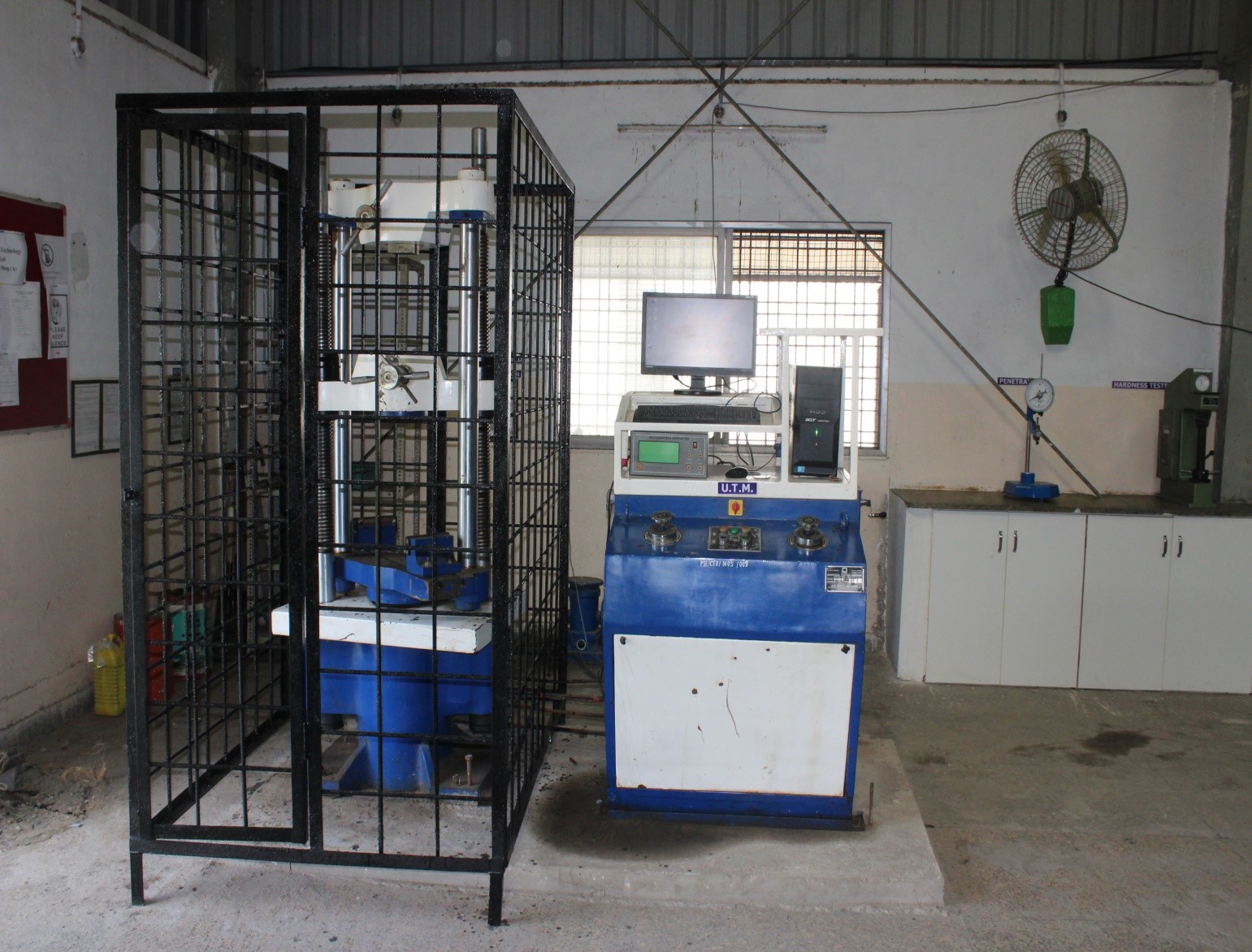
Mechanics of Solids Laboratory

Lab Description
The Mechanics of Solids Laboratory is essential for students to comprehend and apply principles of structural mechanics through practical experiments and analysis. It facilitates the investigation of material behaviour under various loads, aiding in the design and evaluation of safe and efficient structures. Moreover, it cultivates critical thinking and problem-solving skills vital for engineers in ensuring the integrity and stability of built environments.
|
Lab Name |
Mechanics of Solids Laboratory |
|
Equipment |
Universal Testing Machine Single Purchase Winch Crab Izod Impact Testing Machine Compression Testing Machine Wheel & Differential Axel 30cm Force Board, Parallel Force Apparatus Combined Inclined Plane & Friction Slide |
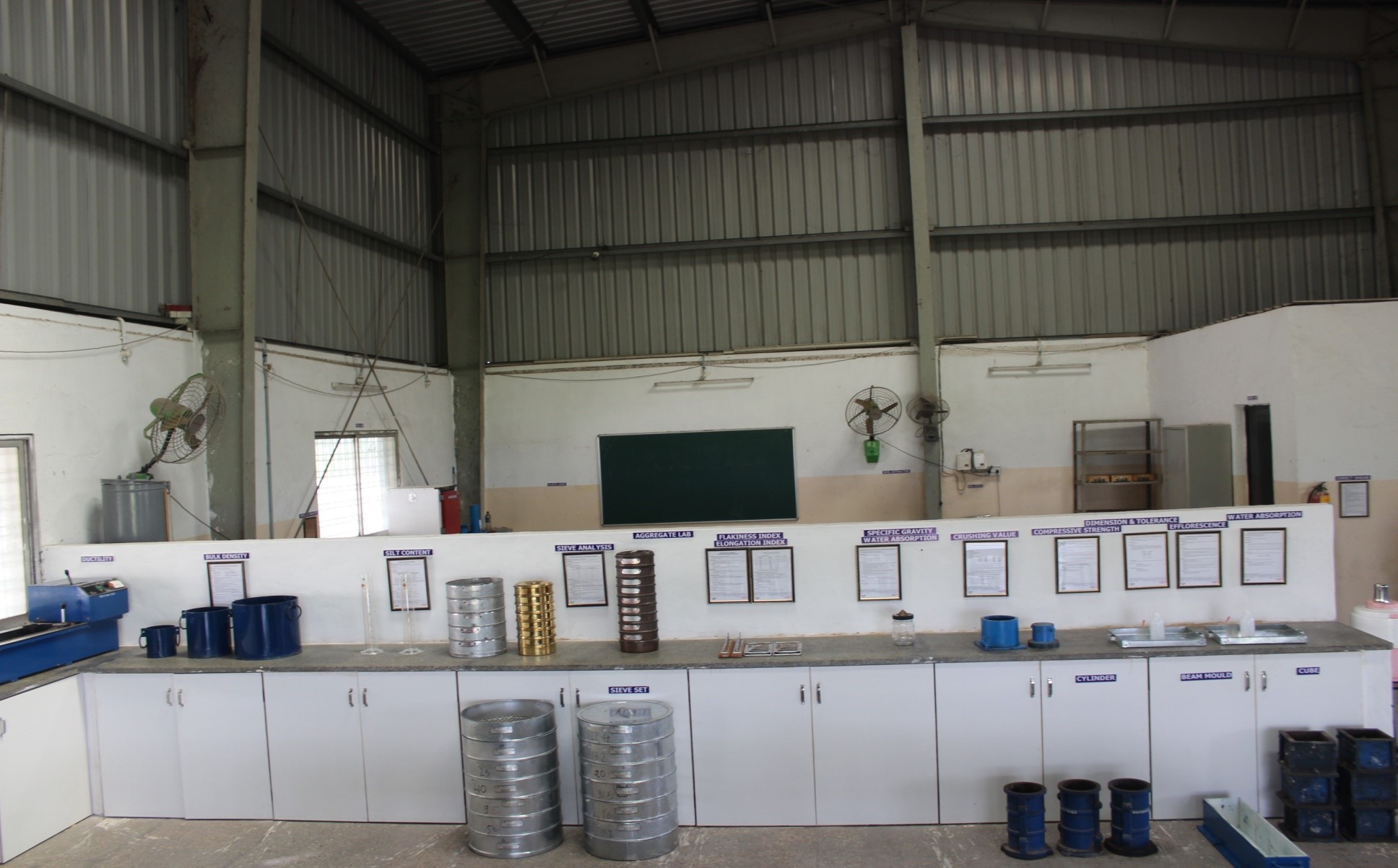
Soil Mechanics

Lab Description
The soil mechanics lab provides hands-on experience in testing soil properties, crucial for assessing its suitability for construction projects. It aids in understanding soil behavior under varying conditions, guiding foundation design and slope stability analyses. Additionally, it facilitates research and innovation in geotechnical engineering, ensuring the safety and durability of infrastructure.
|
Lab Name |
Soil Mechanics |
|
Equipment |
Mosturing Tin, Wash Bottle Sand Replacement Apparatus Permeability Test Apparatus Drum, Plastic Pipe, Hydrometer Glass Plate, China Dish, Brass Rod Liquid limit Device, Plastic limit Device |

Fluid Mechanics

Lab Description
Fluid mechanics labs offer students the opportunity to apply theoretical concepts learned in lectures to real-world experiments, enhancing their understanding of fluid behaviour. Engaging in lab activities develops practical skills such as data collection, analysis, and experimental design, which are essential for careers in engineering and scientific research.
|
Lab Name |
Fluid Mechanics |
|
Equipment |
Nozzle Meter Test Rig Free Vortex Apparatus Forced Vortex Apparatus Pitot Tube Setup, Venturimeter Study Of Pressure Measurement Cavitations Apparatus, Reynold's Apparatus Orifice meter And Rota meter Calibration Setup Sudden Enlargement And Sudden Contraction |

Highway Engineering

Lab Description
Highway engineering labs play a pivotal role in testing and evaluating materials and designs used in road construction, ensuring durability, safety, and efficiency of transportation infrastructure. These labs provide valuable insights into pavement performance, traffic flow, and environmental impact, aiding in the development of sustainable and resilient highway systems.
|
Lab Name |
Highway Engineering |
|
Equipment |
Flakiness Apparatus C.B.R Test Apparatus Impact Test Apparatus Standard Penetrometer Ductility Testing Apparatus Sieve Shaker, Sieve Set-Finer Compression Testing Machine Softening Point Test Apparatus Flash & Fire Point Test Apparatus Marshall Stability Test Apparatus |

Surveying / Advance Surveying

Lab Description
Surveying labs are essential for teaching students fundamental skills in measurement, mapping, and land surveying techniques, providing hands-on experience with state-of-the-art equipment. Surveying labs often involve teamwork and problem-solving activities, fostering collaboration and critical thinking skills among students as they work together to overcome challenges encountered in field surveys, data analysis, and interpretation.
|
Lab Name |
Surveying / Advance Surveying |
|
Equipment |
Engineer Plane Table Surveyor Compass Vernier Theodolite Planimeter, Tilting Level Dumpy Level, Prismatic Compass Levelling Staff, Arrows, Optical Square Measuring Chain, Ranging Rod –Folding Cross Staff, Pegs, Line Ranger, Total Station |

Environment Engineering

Lab Description
Environmental engineering labs are crucial for studying and analyzing pollutants, water quality, and air emissions, enabling the development of effective strategies to mitigate environmental impact. Environmental engineering labs facilitate research and innovation in environmental technology, leading to solutions that promote environmental sustainability and human health.
|
Lab Name |
Environment Engineering |
|
Equipment |
Water Bath, Desicator Jackson's Turbidity Meter Auto Clave, Turbiditimeter Hot Air Oven, Air Incubator Photo Meter, Nephelo Meter Electronic Weighing Machine Muffel Furance, Jar Apparatus Cod Digester, BOD Incubator Digital Ph Meter (With Glass Electrode) |

Project / Design Engineering

Lab Description
Design engineering labs are essential for fostering innovation, creativity, and practical skills among students, providing them with opportunities to conceptualize, prototype, and test their engineering designs.
|
Lab Name |
Project / Design Engineering |
|
PC Configuration |
Acer/Veriton Series Intel(R) Core(TM) i3-2120 CPU@3.30 GHz RAM:2.00GB HDD:320GB 1) Windows 7 Ultimate 2) Ubuntu |

Electrical Machine Lab

Importance of Lab
A machine lab is a facility equipped with various types of motors and related equipment for conducting experiments, demonstrations, and practical training sessions. Machine labs provide students with hands-on experience in operating, testing, and troubleshooting different types of motors, helping them gain practical skills and insights into motor behavior, performance, and control.
|
Lab Name |
Electrical Machine Lab |
|
Equipment |
DC Shunt motor # Synchronous Generator DC Shunt motor # DC Compound Generator with Panel DC Shunt motor # DC Shunt Generator with Panel DC Shunt motor # DC Series Generator with Panel DC Shunt motor # DC Shunt Generator with Panel DC Series motor # DC Shunt Generator with Panel AC slip ring Induction motor # Dc shunt Generator with Panel AC squirrel cage Induction motor # Dc shunt Generator with Panel AC 1 -phase Induction motor Universal Motor AC capacitor start & run motor AC 3 -phase Induction motor AC 3 -phase Synchronous motor with panel 3 Phase Rectifier 3 Phase transformer 3 Phase Auto Transformer 1 Phase Auto Transformer |

Power Electronics Lab

Importance of Lab
The Power Electronics lab provides students with a comprehensive understanding of power electronic systems and prepares them for careers in fields such as power electronics, renewable energy, electric vehicles, and industrial automation.
|
Lab Name |
Power Electronics Lab |
|
Equipment |
Diode & Zener diode characteristic kit TRIAC characteristics kit MOSFET characteristics kit SCR characteristics kit Step up & Down Transistor chopper Triggering kit for SCR Power Electronics lab kit UJT firing circuit for SCR VPE Spartan 6 development board TMS 320F 2812/32 bit DSP trainer kit Intelligent power module (PEC 16DSM01) PMSM motor Chopper / Inverter PWM controller (PEC16HV2B) Single phase SCR power module (PEC14HV4D Smart Power Module 3-phase halfwave Cycloconverter (PEC14H11) Multimeter |

Digital Electronics Lab

Importance of Lab
Digital electronics are easier to design and manufacture than analog electronics,, as they can be implemented using standard components such as transistors and gates. Digital electronics are more energy efficient than analog electronics, as they can perform the same operations using less power.
|
Lab Name |
Digital Electronics Lab |
|
Equipment |
Digital Lab trainer kit Power supply IC's |

High Voltage Lab

Importance of Lab
Today, the quality of life has reached such a state, that our living is practically unthinkable without electricity. Electricity is, perhaps, the third most important commodity, coming next only to air and water, for the existence of life. All of us are aware that load centers are usually far away from the generating stations, which are located in remote areas depending on the type of generation. To avoid unnecessary losses over long distances, power is invariably transmitted at higher voltages. In fact, the country is entering a stage where transmission has reached Ultra High-Voltage (UHV) levels. All this necessitates the development of appropriate insulation materials and their use in High Voltage power apparatus. There assessment calls for a High-Voltage laboratory. A high-Voltage laboratory needs to be established to carry out fundamental studies on insulating materials, to carry out the performance evaluation of proto types and also to assess the condition of High-Voltage power apparatus before their erection and installation to carry out the performance evaluation of proto types and also to assess the condition of High-Voltage power apparatus before their erection and installation.
|
Lab Name |
High Voltage Lab |
|
Equipment |
Horn Gap Arrester 60 KV Oil Test Kit 30 KV Insulator Material Tester kit Insulator Disc Assembly Reactor Capacitance Divider HV Rectifier Assembly Sphere Gap Assembly Rod Gap Assembly HV Rectifier Assembly Impulse Generator Charging Resistor |

Switch Gear & Protection Lab

Importance of Lab
In the realm of electrical systems, where safety and reliability are paramount, switch gear and protection plays pivotal roles. This essential infrastructure is responsible for safeguarding equipment, controlling power flow and ensuring efficient operation. Protection devices integrated within switched gear are designed to detect and mitigate faults, such as short circuit, overloads, promptly. These faults can lead to catastrophic consequence, including equipment damage, electrical outage, and even entangling human lives. The role of the protection system is to identify faults in the network and swiftly isolate the faulty section, preventing the spread of potential damage.
|
Lab Name |
Switch Gear & Protection Lab |
|
Equipment |
A.C Motor protection study system. Alternator- DC motor test test. C.T. polarity test. Generator protection tester. Induction Motor. Polarity test of potential transformer. Radial feeder protection study system. |

Circuit and Network Lab

Importance of Lab
A circuit and network lab typically focuses on practical experiments and demonstrations related to electrical circuits and networks. The Lab has single phase and three phase AC power supplies and DC power supply.
|
Lab Name |
Circuit and Network Lab |
|
Equipment |
Super position kit Thevenin kit Norton kit Kvl & kcl kit |

EMMI Lab

Importance of Lab
Electrical Measurement and Measuring Instruments Lab is equipped with state-of-the-art instruments and resources to provide hands-on experience in electrical measurement techniques.
|
Lab Name |
Electrical Measurement and Measuring Instruments Lab |
|
Equipment |
Maxwell’s inductance/capacirtance bridge kit Wein’s bridge kit Anderson’s bridge kit Hay’s bridge kit De sauty bridge kit Owen’s bridge kit Schering bridge kit L.v.d.t kit Rtd transducer kit Capacitive transducer kit Thrmistor kit Ldr, pd and pt kit Photovoltaic cell kit Cantilever kit Resistive transducer kit |
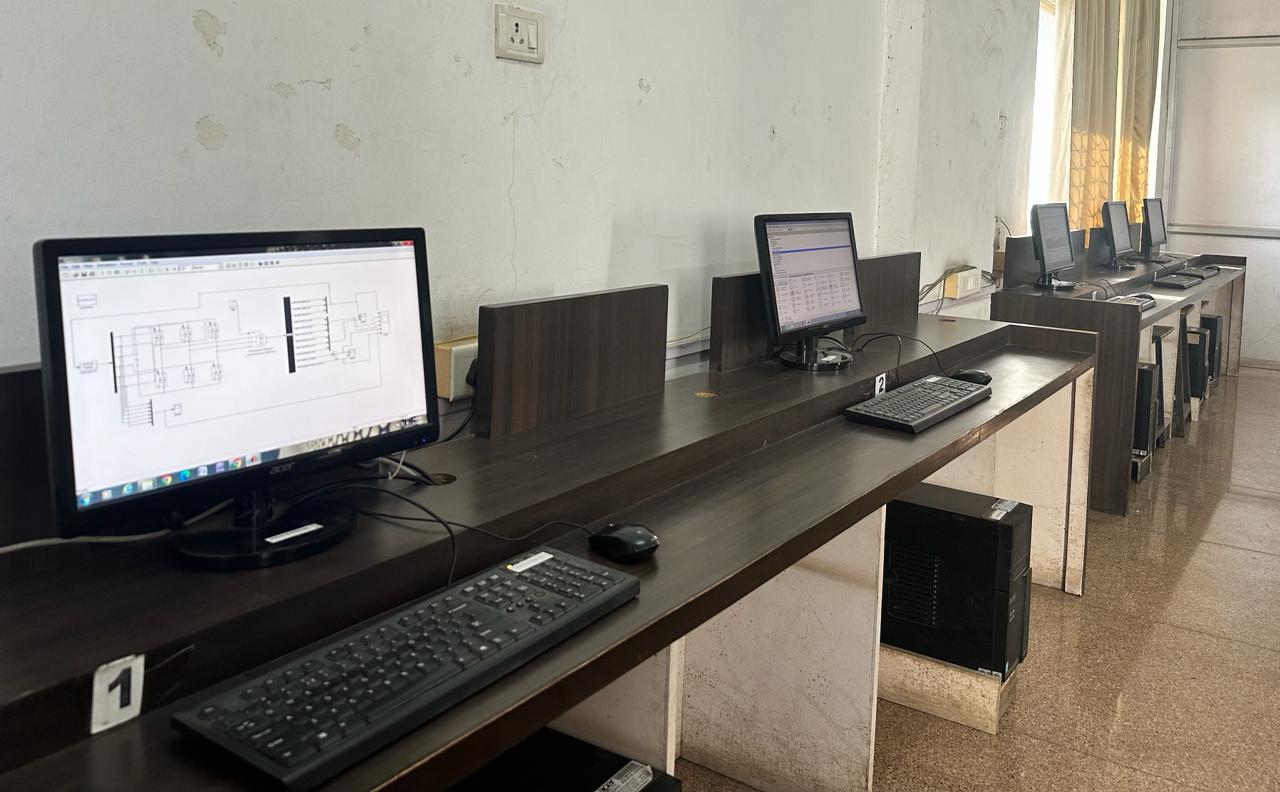
Simulation Lab

Importance of Lab
Simulation supports the scientific method, including the importance of model building. Instructional simulations give students concrete formats of what it means to think like a scientist and do scientific work. This includes the ability to observe the relationships among variables in a model or models. Simulation tools such as MATLAB software package allow students to change parameter values and see what happens. Students develop a feel for what variables are important and the significance of magnitude changes in parameters. Simulations help students better grasp probability and sampling theory by matching simulation results with analytically derived conclusions.
|
Lab Name |
Simulation Lab |
|
Equipment |
Desktop Computer (i3 processor, 4GB RAM) MATLAB Software |
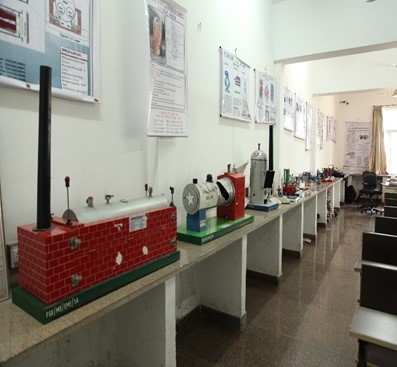
Basic Mechanical Engineering

Importance of Lab
The Basic Mechanical Engineering lab is fundamental for students to gain hands-on experience with fundamental mechanical principles and techniques. It offers practical exposure to basic engineering concepts like thermodynamics, fluid mechanics, and material science, enabling students to understand the application of theoretical knowledge in real-world scenarios. This lab lays the foundation for further specialization in various engineering disciplines and equips students with essential skills for problem-solving and innovation in the field of mechanical engineering.
|
Lab Name |
Basic Mechanical Engineering |
|
Equipment |
Lancashire Boiler Cochran Boiler Locomotive Boiler Gear Train Rack & Quadrant Gear Spur Gear Bewel Gear Helical Gear Spiral Gear Brake and Clutch Centrifugal Pump Single Shoe Brake |

Workshop

Importance of Lab
The Workshop lab is essential for students to gain practical skills and hands-on experience with basic tools and machinery used in engineering disciplines. It provides a foundational understanding of manufacturing processes, machining techniques, and fabrication methods, preparing students for various fields such as mechanical, civil, and electrical engineering. This lab fosters creativity, problem-solving, and teamwork skills, enabling students to conceptualize, design, and build prototypes and projects, essential for their academic and professional development.
|
Lab Name |
Workshop |
|
Equipment |
Carpentry Shop Black Smithy Shop Tin Smithy Shop Plumbing Shop Fitting Shop Fabrication Shop |
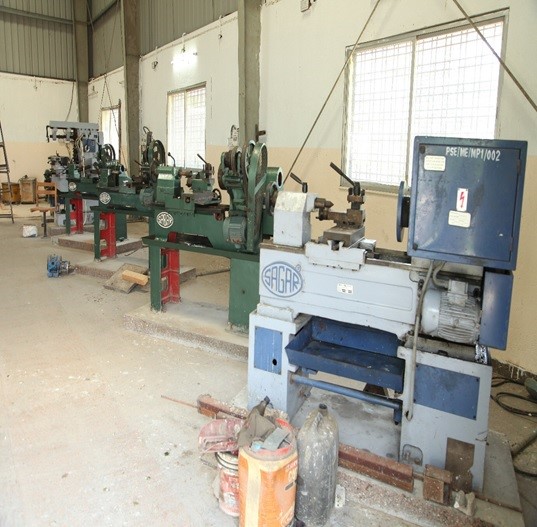
Machine Shop

Importance of Lab
The Machine Shop lab is vital for students to gain hands-on experience with advanced machining equipment and techniques. It provides practical skills in precision machining, metalworking, and fabrication, essential for careers in mechanical, aerospace, and manufacturing engineering. This lab fosters an understanding of material properties, manufacturing processes, and quality control standards, enabling students to design and produce complex components and prototypes with accuracy and efficiency.
|
Lab Name |
Manufacturing Process |
|
Equipment |
Lathe Machine Vertical Milling Machine Horizontal Milling Machine Shaper Machine Slotting Machine Radial Drill Machine Surface Grinding Machine Power Hacksaw Drilling Machine Gear Lathe |

Fluid Power Engineering

Importance of Lab
The Fluid Power Engineering is essential for students to gain hands-on experience with hydraulic and pneumatic systems. It provides practical insights into the design, operation, and control of fluid power components, such as pumps, valves, and actuators, preparing students for careers in mechanical, automotive, and aerospace engineering. This lab fosters skills in system troubleshooting, maintenance, and optimization, enabling students to contribute to the development of efficient and reliable fluid power systems across industries.
|
Lab Name |
Fluid Power Engineering |
|
Equipment |
Hydraulic Ram Test Rig Centrifugal Pump Test rig Reciprocating pump test Rig Francis Turbine Test Rig Pelton wheel turbine Test Rig Double stage Air Compressor Impact of Jet Vens |

Fluid Mechanics

Importance of Lab
The Fluid Mechanics lab is crucial for students to gain practical experience and understanding of fluid behavior and its applications in engineering. Through experiments and simulations, students learn about fluid properties, flow patterns, and hydraulic systems, preparing them for careers in civil, mechanical, and aerospace engineering. This lab fosters hands-on learning and problem-solving skills essential for designing and analyzing fluid-based systems, such as pipelines, pumps, and turbines, contributing to advancements in various industries.
|
Lab Name |
Fluid Mechanics |
|
Equipment |
Bernoulli’s Theorem Apparatus Cavitation Apparatus Force Vortex Apparatus Free Vortex Apparatus Venturimeter, Orifice meter and Rota meter test Rig Loss Due to Pipe Friction Laminar Flow Table Metacentric Height Apparatus Nozzle Meter Test Rig Pitot Tube Apparatus Reynold’s Apparatus |

Theory of Machines

Importance of Lab
The Theory of Machines (TOM) is essential for students to gain practical experience and insights into the design, analysis, and operation of mechanical systems. By conducting experiments and simulations, students learn about the principles of motion, mechanisms, and machine components, preparing them for careers in mechanical engineering, robotics, and automation. This lab fosters critical thinking and problem-solving skills necessary for designing efficient and reliable machinery in various industries.
|
Lab Name |
Theory of Machine |
|
Equipment |
Governor Apparatus Motorized gyroscope |

Dynamics of Machinery

Importance of Lab
The Dynamics of Machinery lab is vital for students to gain practical understanding and hands-on experience in analyzing the motion and behavior of mechanical systems. Through experiments and simulations, students learn about the forces, velocities, and accelerations involved in machinery operation, enabling them to design and optimize mechanical components for various applications. This lab equips students with essential skills for careers in mechanical engineering, where knowledge of machinery dynamics is critical for product development and performance enhancement.
|
Lab Name |
Dynamics of Machinery |
|
Equipment |
Universal Vibration Apparatus Trifillar, Bifilar & Compound System Whirling of shaft Demonstrator Static & Dynamic Balancing Demonstrator |
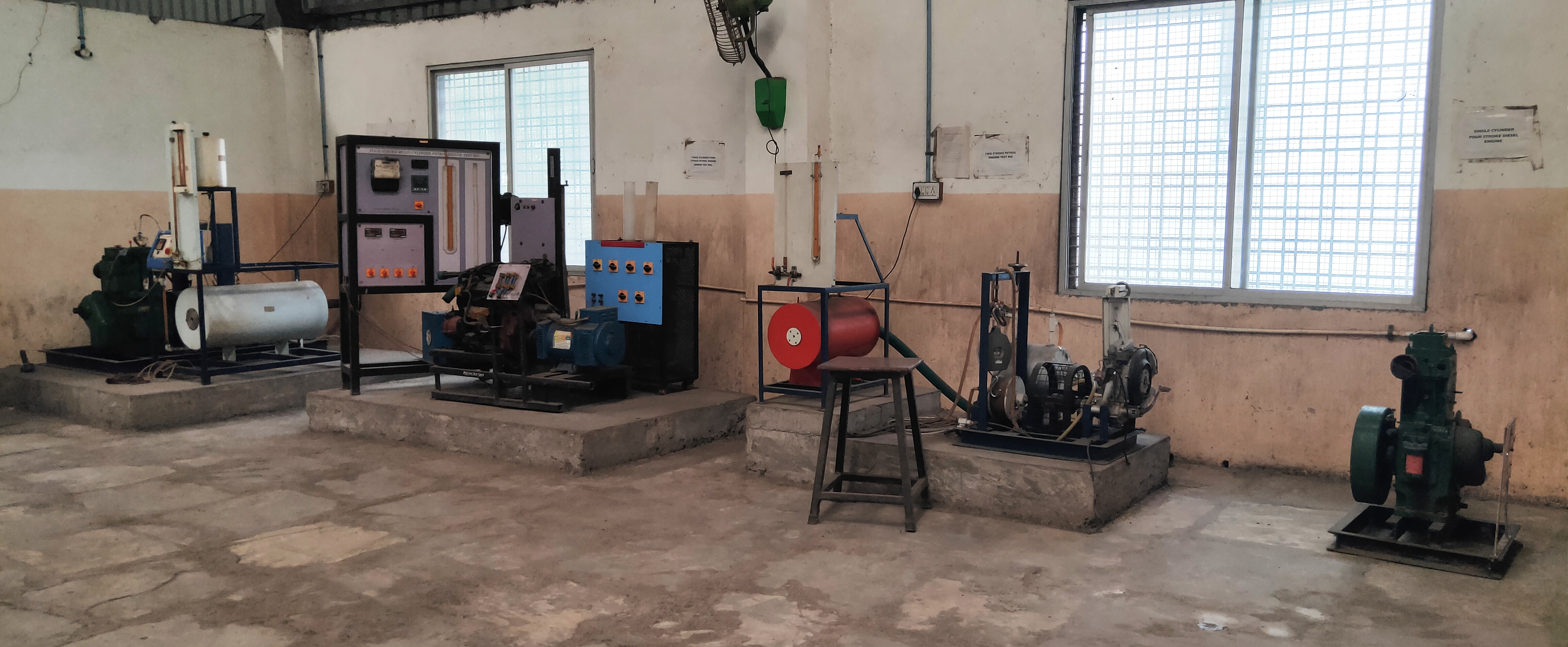
Internal Combustion Engines

Importance of Lab
The Internal combustion engine lab is vital for students to gain practical experience and understanding of the fundamental principles of combustion engines. It provides hands-on learning opportunities for students to explore engine design, performance analysis, and emissions control techniques, preparing them for careers in automotive, aerospace, and energy sectors.
|
Lab Name |
Internal Combustion Engines |
|
Equipment |
Twin Cylinder Four Stroke Diesel Engine Single Cylinder Four Stroke Petrol Engine Single Cylinder Four Stroke Diesel Engine Automobile Ignition System Automobile Lubrication System Automobile Cooling System Single Cylinder Two Stroke Petrol Engine Fuel Supply System for Diesel Engine Three Cylinder Four Stroke Petrol Engine |

Automobile Engineering

Importance of Lab
Automobile engineering lab play a pivotal role by providing students with practical exposure to automotive systems, fostering skill development, innovation, and problem-solving abilities essential for a career in the automotive industry. These labs bridge the gap between theoretical knowledge and real-world applications, preparing students for the challenges of modern automotive engineering.
|
Lab Name |
Automobile Engineering |
|
Equipment |
Automobile Suspension System Automobile Steering System Open Section of Four Wheel drive Automobile Differential System Types of Nozzle Turbo charger |

Mechanical Measurement & Metrology

Importance of Lab
The Mechanical Measurement and Metrology lab in engineering colleges is essential for students to gain practical experience and skills in precision measurement techniques and instrumentations. It provides hands-on learning opportunities to understand measurement principles, calibration methods, and quality assurance procedures, preparing students for careers in mechanical, automotive, and aerospace engineering. This lab fosters an understanding of accuracy, reliability, and traceability in measurements, enabling students to ensure product quality and compliance with industry standards, contributing to advancements in manufacturing and technology.
|
Lab Name |
Mechanical Measurement & Metrology |
|
Equipment |
Dial Vernier Caliper Vernier Height Gauge Mass Strain Gauge Inside Micrometer Point Micrometer Bore Gauge Vernier Depth Guage Universal Bevel Protector |

Material Science & Metallurgy

Importance of Lab
The Material Science and Metallurgy lab is crucial for students to gain practical understanding and hands-on experience in studying the properties, behavior, and processing of materials. It provides opportunities for students to conduct experiments and analyze various materials, such as metals, polymers, and ceramics, preparing them for careers in fields like materials engineering, metallurgy, and manufacturing. This lab fosters skills in material characterization, testing, and analysis, enabling students to develop innovative materials and processes for diverse applications, contributing to advancements in technology and industry.
|
Lab Name |
Material Science & Metallurgy |
|
Equipment |
Binocular metalogical microscope with eye piece Double disc polishing machine Metallurgical Microscope Muffle furnace Profile Projector Rockwell hardness tester Jomni apparatus |
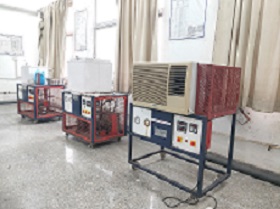
Refrigeration And Air Conditioning

Importance of Lab
The Refrigeration and Air Conditioning lab is essential for students to gain practical knowledge and skills in designing, installing, and maintaining cooling systems. It allows students to understand the principles of refrigeration and air conditioning, explore various components and systems, and develop troubleshooting abilities. This hands-on experience prepares them for careers in HVAC engineering, energy efficiency, and sustainable building design.
|
Lab Name |
Refrigeration And Air Conditioning |
|
Equipment |
Refrigeration Test Rig. Vapor absorption System test Rig. Window Air conditioning test Rig. Ice Plant test Rig. |

CAD/CAM Lab

Importance of Lab
The CAD/CAM lab is essential for students to learn computer-aided design and manufacturing techniques, enabling them to create, simulate, and optimize products and processes digitally. This hands-on experience helps students develop proficiency in industry-standard software, enhancing their design capabilities and engineering efficiency. The lab prepares students for careers in various fields, including product development, manufacturing, and mechanical engineering, by equipping them with practical skills highly valued in the industry.
|
Lab Name |
CAD/CAM |
|
Equipment |
28 PCs with CAD and CAM Software |
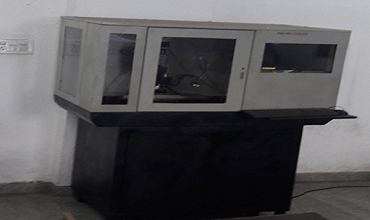
CIM

Importance of Lab
The CIM (Computer Integrated Manufacturing) lab in engineering colleges is crucial for students to understand the integration of computer technology in manufacturing processes. It provides hands-on experience with software and hardware systems used to automate manufacturing operations, such as CNC machines and robotics. This lab equips students with skills in process optimization, quality control, and production management, preparing them for careers in advanced manufacturing industries where efficiency and innovation are paramount.
|
Lab Name |
CIM |
|
Equipment |
CNC Lathe CNC Milling |

Chemistry Laboratory

|
Lab Name |
Chemistry Laboratory |
|
Lab Description |
Well-equipped laboratory containing consumables and non-consumables required to conduct the practical experiments of Chemistry (1st year), Organic Chemistry & Unit Processes (2nd Year) and Physical and Inorganic Chemistry (2nd Year) |
|
No. of Machines |
12 including Furnace, pH meter, Distillation assemblies, TDS meter, etc. And several glass wares and chemicals |
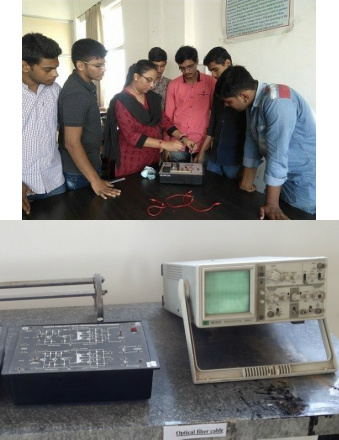
Engineering Physics Laboratory

|
Lab Name |
Engineering Physics Laboratory |
|
Lab Description |
Well-equipped physics laboratory with so many electrical kit and optical device |
|
Configuration |
Diode characteristics kit, Band gap measurement kit, Ultrasonic Sensor kit, Solar energy trainer, Fiber Optics kit with cathode ray Oscilloscope and frequency generator, Charging and discharging of capacitor using R-C circuit, wavelength of LASER using diffraction grating |
|
No. of Machines |
14 |
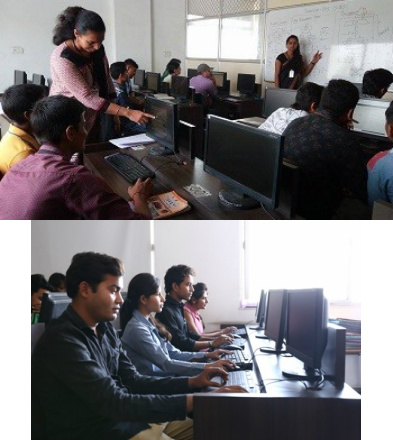
Language Laboratory

|
Lab Name |
Language Laboratory |
|
Lab Description |
Well-equipped Language laboratory with updated language software |
|
Configuration |
Computers with Processor-core2 Duo, Ram-2GB, Hard Disk-250 GB and Operating System-Windows7 |
|
No. of PC |
PC-20 |


